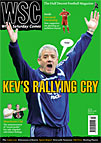 England need to get Jack Warner on side if they hold any hope of hosting the 2018 World Cup
England need to get Jack Warner on side if they hold any hope of hosting the 2018 World Cup
As you know, the England team won’t be too busy this summer. So they are arranging a friendly for June, in Trinidad to celebrate the centenary of the FA there. This will be the first time that a full England team have played in the Caribbean, which is surprising, though not more so than the fact that their only ever game in Anglophone Africa was in Durban in 2003.
While the anniversary of the Trinidad & Tobago FA is the official reason for the trip – which may also let Fabio Capello give David Beckham a 100th cap without the player having to fly the Atlantic – it really serves another purpose. Football there is run by Jack Warner, who is a vice-president of FIFA and head of the regional Concacaf federation, which holds three of the 24 votes that will determine the venue for the 2018 World Cup.
The FA want Warner on their side, which will necessitate a good deal of kow-towing given recent history. The T&T FA first suggested the fixture several months ago, but they were turned down because the proposed date, in August 2008, would not have been acceptable to clubs. That rejection came at a time when relations had already turned sour, with Warner publicly railing against the English bid for 2018. “There are moves to give it to England. I must fight that… Nobody in Europe likes England. England invented the sport but has never made any impact on world football.”
A half-decent case could be made for the latter two points, but Warner was mostly retaliating to two specific slights. First, there was the basic fact that there were going to be European bids for 2018, which was the next time on FIFA’s rotation system that a Concacaf country could be hosts. Second, the British media had covered extensively criticisms of Warner by the author Andrew Jennings, whose book Foul! documented allegations of corruption involving Warner and other FIFA officials. Jennings has also done admirable work exposing the Olympic movement.
In December 2006, FIFA’s executive committee had censured Warner over his son Daryan’s resale of their FA’s World Cup ticket allocation through a travel company formerly owned by the Warner family. They requested that Daryan make a payment to charity equal to his profit, but lacked the power to enforce that decision. Then the T&T squad began a legal dispute with their federation after they had been offered a bonus of TT$5,000 (just over £400) a man for their 2006 performances; the federation claimed to have made TT$18 million out of the World Cup but the players’ lawyers subsequently established that profits had been around ten times that amount.
The players were subsequently blacklisted, which meant T&T sent a shadow squad to the 2007 Concacaf Gold Cup, where they flopped badly. In January 2008, the FA of Dominica said they would report Warner to FIFA’s ethics committee for making “an unquestionably illegal” demand that the federation’s executive committee be replaced; FIFA has since said that Warner’s recommendations are “under review”. There is more, far more, on Jennings’ website, transparencyinsport.org.
To succeed, the English 2018 bid will require the accommodation of powerful men such as Warner. FA officials can hardly be squeamish about mixing with such questionable characters when we have a few of our own – Warner’s use of his position for financial gain has parallels with certain individuals within the English game. But this is just the first of what will be a whole series of hoops to be jumped through during the bidding process.
And, of course, it may prove to be a colossal waste of time. The FA know all about that from their spectacularly inept campaign to stage the 2006 finals. In one week in 2000, bidders England and South Africa both played friendlies in Malta. Ostensibly this was to help mark the 100th anniversary of the local federation. More specifically, the Maltese FA president Joseph Mifsud was one of the eight European delegates who would be voting on the destination of the 2006 World Cup – but he wasn’t to be among the two who voted for England.
The dilemma is that no one bidding for a tournament stands a chance unless they are willing to stage matches of questionable value, such as that in Malta, and court people that they would normally be reluctant to engage with. By playing in Trinidad, England are going to do both at once and deserve to lose support from those who wish to clean up the game.
From WSC 253 March 2008